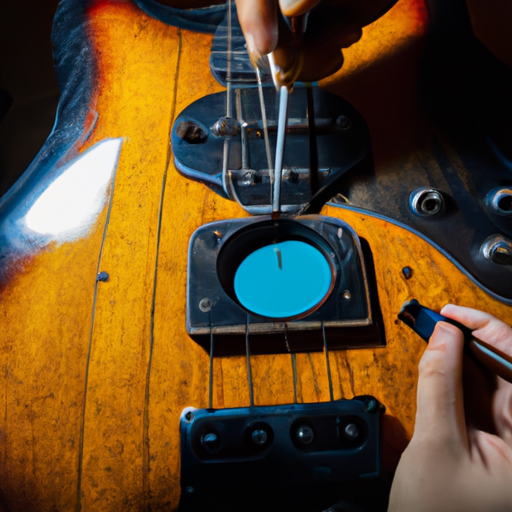
Guitar maintenance and care are essential to ensure your instrument stays in top condition and delivers optimal performance throughout its lifespan. Proper maintenance requires time and effort, but it is worth it in the long run as it can extend the life of your guitar and save you money on expensive repairs.

A. Importance of Taking Care of Your Guitar

Your guitar is a valuable investment, and proper maintenance can help protect and preserve its value, ensuring it retains its sound and playability. Regular maintenance also helps to prevent the build-up of dirt, sweat, and grime, which can affect the guitar's sound and appearance.
B. Factors that Affect Guitar Performance and Lifespan
Several factors can affect your guitar's performance and lifespan, including humidity, temperature changes, and neglect. Regular maintenance can mitigate these factors and help to ensure your guitar stays in top condition.
A. Tools Needed for Cleaning Your Guitar
To clean your guitar, you will need a few essential tools, including a soft cloth, guitar polish, and a guitar string cleaner. You can also use a soft-bristled toothbrush to clean hard-to-reach areas.
B. How to Clean the Body, Fretboard, and Strings
To clean the body of your guitar, use a soft cloth with guitar polish, making sure to avoid the sound hole and pickup area. To clean the fretboard, use a damp cloth with a guitar string cleaner, making sure to avoid the frets. To clean the strings, use a soft cloth with a guitar string cleaner, wiping each string individually.
C. Tips for Cleaning Your Guitar Without Causing Damage
When cleaning your guitar, avoid using abrasive materials, harsh chemicals, or excessive force, as these can cause damage to the finish, fretboard, or strings. Use a light touch and gentle, circular motions to clean your guitar.
A. Best Practices for Storing Your Guitar
The best way to store your guitar is to keep it in a hard case or gig bag when not in use, storing it in a cool, dry place away from direct sunlight. You can also use a guitar hanger or stand to store your guitar, making sure to avoid any areas with high humidity or temperature fluctuations.
B. Factors to Consider When Selecting a Storage Location
When selecting a storage location, consider factors such as humidity, temperature, and lighting. Avoid storing your guitar in damp, humid areas or near windows or doors that receive direct sunlight. Choose a place with moderate temperature and good ventilation.
C. Common Mistakes to Avoid When Storing Your Guitar
Avoid storing your guitar in areas with extreme temperature or humidity fluctuations, such as garages or attics. Also, avoid leaning your guitar against walls or furniture, as this can cause it to fall and get damaged.
A. How Often to Change Strings
You should change your guitar strings every 2-3 months or more frequently if you play regularly. Old strings can affect your guitar's sound and playability, and they can be harder to tune.
B. Types of Strings Available
There are several types of guitar strings available, including nylon, steel, and coated strings. Each type has its unique sound and feel, and you should choose the type that best suits your playing style and preferences.
C. Tips for Prolonging String Life
To prolong the life of your guitar strings, wipe them down after each use, store your guitar properly, and avoid excessive bending or stretching of the strings. You can also use a string lubricant to reduce friction and extend string life.
A. How to Spot Problems with Frets
You can spot problems with frets by checking for buzzing or dead notes, uneven frets, or wear on the frets. If you notice any of these issues, it may be time to have your frets checked or replaced.
B. How to Clean and Maintain Frets
To clean and maintain your guitar's frets, use a soft cloth with a fretboard cleaner, making sure to avoid the wood. You can also use a toothbrush or fret polishing cloth to remove any dirt or debris.
C. When to Replace Frets
You should replace your guitar's frets if they are worn down or uneven, affecting your guitar's playability. This is a job best left to a professional guitar technician.
A. Why and When to Adjust the Truss Rod
You may need to adjust the truss rod if your guitar's neck is too bowed or too straight, affecting your guitar's playability. You should only attempt this if you have experience with guitar repairs or take it to a professional guitar technician.
B. How to Adjust the Truss Rod
To adjust the truss rod, use a specialized tool, such as an allen wrench, to turn the rod clockwise or counterclockwise, depending on the adjustment needed. Make small adjustments and check the neck's curvature as you go.
C. Common Mistakes to Avoid When Adjusting the Truss Rod
Avoid over-tightening the truss rod, as this can damage your guitar's neck or cause it to break. Also, avoid making adjustments if you are unsure or inexperienced with guitar repairs.
A. How to Clean and Maintain the Bridge and Saddle
To clean and maintain your guitar's bridge and saddle, use a soft cloth with a guitar polish, making sure to avoid the strings and other parts of the guitar. You can also use a toothbrush or cotton swab to clean hard-to-reach areas.
B. How to Spot Problems with the Bridge and Saddle
You can spot problems with the bridge and saddle by checking for cracks, warping, or damage to the intonation. If you notice any of these issues, it may be time to have them checked or replaced by a professional guitar technician.
C. When to Replace the Bridge and Saddle
You should replace your guitar's bridge and saddle if they are damaged or affecting your guitar's sound and playability. This is a job best left to a professional guitar technician.
A. How to Clean and Maintain the Tuning Machines
To clean and maintain your guitar's tuning machines, use a soft cloth with a guitar polish, making sure to avoid the strings and other parts of the guitar. You can also use a toothbrush or cotton swab to clean hard-to-reach areas.
B. How to Spot Problems with the Tuning Machines
You can spot problems with the tuning machines by checking for slipping or sticky tuners, loose screws, or other damage to the tuners. If you notice any of these issues, it may be time to have them checked or replaced by a professional guitar technician.
C. When to Replace the Tuning Machines
You should replace your guitar's tuning machines if they are damaged, affecting your guitar's tuning stability or playability. This is a job best left to a professional guitar technician.
A. How Humidity and Temperature Affect Your Guitar
Humidity and temperature changes can affect your guitar's sound, playability, and structural integrity. High humidity can cause the wood to swell, affecting the guitar's neck and bridge, while low humidity can cause the wood to dry out, leading to cracks and warping.
B. Best Practices for Protecting Your Guitar from Environmental Damage
To protect your guitar from environmental damage, store it in a cool, dry place away from direct sunlight and use a humidifier or dehumidifier if necessary. You can also use a guitar case or bag with built-in humidity control to help regulate the environment around your guitar.
A. Recap of Key Points
Proper guitar maintenance and care are essential to ensure your guitar stays in top condition and delivers optimal performance throughout its lifespan. Regular cleaning, storage, and maintenance of the frets, strings, truss rod, bridge, and tuning machines can help to mitigate factors that affect guitar performance and lifespan.
B. Final Thoughts on Guitar Maintenance and Care
Investing time and effort into guitar maintenance and care can help to extend your guitar's lifespan, preserve its value, and ensure it delivers the sound and playability you deserve. Whether you're a beginner or a seasoned player, proper maintenance is essential to keep your instrument in top condition.
Click here for professional guitar maintenance and services.